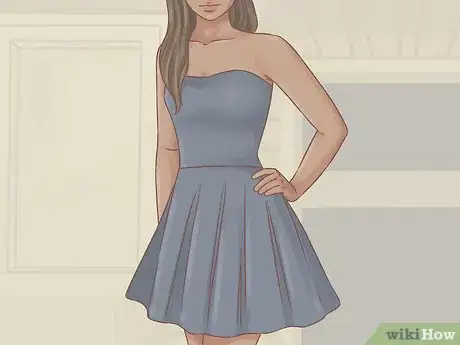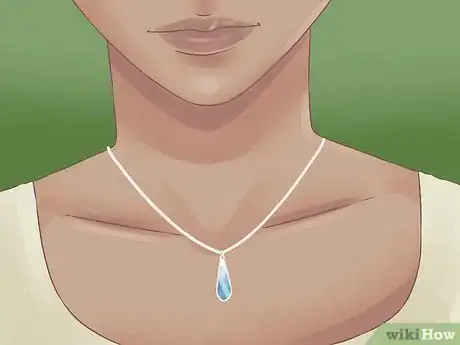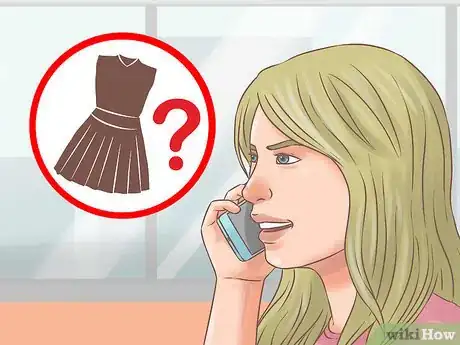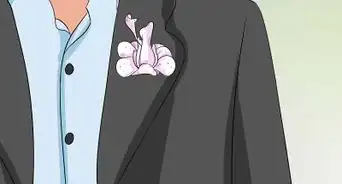This article was co-authored by Kalee Hewlett. Kalee Hewlett is a Celebrity Stylist & Confidence Coach with almost two decades of experience helping clients build confidence and ‘dress for success.' She works with her clients to transform their sense of self 'from the inside out’ by merging her expertise in image consulting with Neuro-Linguistic Programming. Kalee’s work is rooted in science, style, and the understanding that ‘identity is destiny'. She uses her own methodology and Style To Success Strategy to create positive identity shifts. Kalee is a fashion TV host and appears regularly on QVC UK sharing her fashion expertise. She also was appointed as the head judge and host of Fashion One Network’s 6-part TV show 'Design Genius.’
There are 8 references cited in this article, which can be found at the bottom of the page.
This article has been viewed 311,033 times.
Is it your first time going to the theater? The theater is one of the few remaining places where traditional rules of genteel society still apply. The actors, set designers, stagehands and director putting on a stage production have worked countless hours to give audiences a show with a polished, professional appearance—theatergoers should be respectful enough to return this consideration. Unless specified by the theater directors, it's not necessary to show up in full formal attire, but knowing some basic guidelines for dress can greatly enhance the atmosphere of a night out at the theater.
Steps
Dressing Formally
-
1Pick out flattering formal attire. In some cases, such as opening nights and special "black tie" events hosted by the theater, attending a stage production might require formal dress. For these occasions, you should plan to piece together some of the more elegant selections from your wardrobe. Typically, black and white will be the best chromatic choices for such events.
- If a production is advertised as "black tie" or "white tie," or if it's an inherently formal type of event, like an opening night or opera, this means that formal dress standards are expected.
-
2Wear clothing that is appropriate for a special event setting. In contemporary times, the rules of formal dress have changed somewhat. One effective strategy is to dress in a manner similar to the way you would for a night out at an upscale restaurant, or perhaps even a professional setting. If you're a woman, this may be a mid-length skirt or pant suit, although evening wear like a tasteful cocktail dress will create a more alluring look. Men should choose a well-fitting suit in dark, neutral evening hues; shirtsleeves with a tie and pressed slacks are also generally acceptable.[1]
- For modern formal theater events, the same attire you might wear to a wedding, funeral or charity dinner will generally be sufficient.
Advertisement -
3Accessorize for your ensemble. Finalize your formal look with necklaces, bracelets, watches and other jewelry. Wear closed-toes shoes with appropriate stockings or dress socks, even in the summer. Carry a matching purse or handbag for small belongings (if you have a larger bag that might take up too much aisle space, leave it at home). And, of course, be courteous to the actors and other patrons and keep cell phones and other devices put away until after the show.[2] [3]
- Oversized or abundant jewelry can look gaudy and distract from a sharp outfit.
- Binoculars are permissible if the theater where the production is being staged is quite large, or for those with who have trouble seeing at a distance. Because they don't make noise or emit light, like phones and camera, binoculars are considered normal theater accessories.
-
4Wash and style your hair. Your hair is also a vital part of your appearance. Scruffy hair that is tangled and in need of a wash can spoil an otherwise dapper ensemble, so be sure to wash it the night before or the morning of the show. Buns, loose curls or straightened hair is encouraged for women. Men should keep hair tamed with pomade, slick or part hair that is grown out or pull long hair back neatly.[4] [5]
- Consult a style guide for options on how to style hair of your consistency and length.
- As silly as it sounds, hats and tall hairdos can obstruct the view of the people sitting around you. As a rule, hats should not be worn indoors, and you should think of the other theater patrons when coiffing your locks.
Dressing Casually
-
1Go with acceptably casual garb. "Casual" as a mode of dress has a different meaning than is typically assumed, so don't show up wearing just anything. If a casual dress style is best suited for a certain production, you will still be expected to present a nice appearance because even though there may not be a formal dress code imposed, as an audience member you are agreeing to be part of a meticulously organized event. Shorts, t-shirts, tanktops and sandals will not fly here: think "dinner at slightly upscale restaurant," not "lazy evening after work."
-
2Dress plainly and comfortably. Remember how your mother used to dress you for Easter Sunday or to go visit your relatives? Take cues from mom's casual style. Good choices for men are khakis, polos or button-down shirts and loafers or boat shoes. Women arguably have more options: a simple blouse and skirt will work just fine, or you might break out a sundress or knit sweater and tights depending on the weather.
- No matter what you wear, make sure you are dressed for comfort. You will be sitting down for a couple of hours, so settle on garments that don't chafe and aren't too snug.
-
3Take advantage of the season. There are many wonderful seasonally-exclusive pairings when it comes to dressing and accessorizing. Make use of them. Spring and summer is the time to work with lighter colors and fabrics like pastels, while fall and winter favor heavier materials and an intricate layered look. Cardigans, corduroy, dress boots and linen can all become components of a spruced-up seasonal style.
- The theater may get a little hot or chilly in certain climates. Bring a warm extra layer that you can shed if need be.
-
4Practice good hygiene. Just because the event isn't a formal one doesn't mean you shouldn't go to the necessary lengths to make yourself presentable. Keep hair and clothing clean and arranged; tuck in loose shirt tails and don't wear skirts or dresses that fall above the thigh-line, or tops that expose too much cleavage. You'll be in a crowded theater right next to other audience members, so freshen up your deodorant. If perfume or cologne is desired, it should be applied lightly, as excessively strong fragrances are overpowering.[6]
- Brushing your teeth, trimming your nails, wearing clean socks and washing your face and hands are also good hygienic habits to be in. It would be embarrassing to be a nuisance to other theatergoers because of the way you look or smell.
Dressing for a Particular Production
-
1Know what is expected. Not all theaters will require the same formality of dress. Pay attention to what kind of production you'll be attending and decide the most appropriate way to dress. For instance, it's improbable that a production aimed for children will require any particular fashion sensibilities, whereas attending even a small, locally produced opera might make you want to consider nicer wardrobe choices. In this case it's all about context. Special black tie events and opening nights will usually call for formal attire, while you should feel free to dress casually for the average Broadway or matinee show, or for more conceptual dramas like those put on by black box theaters.
- It can be a good idea to run a search or call up the theater managers before a show to find out whether there is an expected dress code.[7]
- If you're ever uncertain about what to wear to a given event and have no guidelines to follow, it's usually alright to go casual.
-
2Buy and wear merchandise. If you've seen the show before, or if a merchandise booth is selling souvenirs before the show, grab a t-shirt or hat to show your support. Many long-running or family oriented shows appreciate when fans show up wearing that production's apparel. These products are often unique and exclusive to that live performance, so you'll never have a better chance to model them.
-
3Put on costumes and facepaint. This is a no-no for most opening nights and more focused productions, but for established shows like The Lion King and Wicked it is encouraged and can be a lot of fun, especially for younger kids. Dress yourself or your child up as your favorite characters and have fun immersing yourself in the event. Just don't go too overboard with costumes and props—remember, an audience member's appearance can be distracting.
- Do some research to find out whether a particular show recommends the use of costumes and props before you buy your tickets and decide what to wear. Even then, keep elaborate costumes reasonable and don't be tempted to act out or make noise during the show.
-
4Wear everyday clothes. In rare instances it may be okay to come as you are. Off-Broadway shows and smaller productions usually don't mandate a dress code, so jeans and sneakers won't be an issue. Make sure you always know ahead of time what the expected mode of dress is for a given production or venue, and enjoy an increasingly uncommon opportunity to present yourself fashionably at a formal society event.
- Even if normal clothes are allowed, it's never a bad idea to dress nicely. Your appearance says something about your character, so make sure it has good things to say.[8]
Community Q&A
-
QuestionWhat would be appropriate to wear to a production of Phantom of the Opera?
 Community AnswerCocktail attire would be most appropriate if the performance is in the evening. Men may wear suits or blazers, and women should wear cocktail dresses or dressy separates.
Community AnswerCocktail attire would be most appropriate if the performance is in the evening. Men may wear suits or blazers, and women should wear cocktail dresses or dressy separates. -
QuestionWhat would be appropriate to wear to a production of Aladdin?
 Community AnswerThere is no required dress code in a Broadway theater. However, it is recommended you dress up a little. You can dress casually or formally, just be neat.
Community AnswerThere is no required dress code in a Broadway theater. However, it is recommended you dress up a little. You can dress casually or formally, just be neat. -
QuestionWhat would be appropriate to wear to a production of Hamilton at the Richard Rogers Theatre?
 Community AnswerDefinitely dressy attire - a suit for men, and a cocktail dress or other nice dress for women.
Community AnswerDefinitely dressy attire - a suit for men, and a cocktail dress or other nice dress for women.
Warnings
- In general, open-toed shoes, sandals and flip flops are looked down upon for theater events, no matter the time of year.⧼thumbs_response⧽
References
- ↑ http://www.umsl.edu/depts/career/files/pdfs/Professional%20Dress%20Handout.pdf
- ↑ http://effortlessgent.com/ten-simple-ways-to-accessorize-suit/
- ↑ https://uncova.com/how-to-accessorize-your-formal-attire
- ↑ http://www.askmen.com/fashion/fashiontip/567_formal-hairstyles-for-men.html
- ↑ http://stylecaster.com/beauty/formal-hairstyles/
- ↑ http://www.primermagazine.com/2011/learn/15-hygiene-habits-that-you-shouldnt-miss-in-your-daily-routine
- ↑ Kalee Hewlett. Image Consultant. Expert Interview. 20 April 2021.
- ↑ http://www.theguardian.com/stage/theatreblog/2011/mar/31/theatre-dress-up-audience
About This Article
Before you dress for the theater, try calling the theater and asking if there is an expected dress code for the production you’re attending. If there's no formal dress code, try dressing in comfortable, stylish clothes similar to what you’d wear to dinner at a slightly upscale restaurant. It’s also a good idea to wear layers, such as a light sweater or scarf, that you can take off if the theater gets too warm. Additionally, make sure that your hair is clean and combed and you’re not wearing too much fragrance, since the smell can bother people sitting next to you. For advice on how to dress for a formal theater production, like an opera, keep reading.









































































